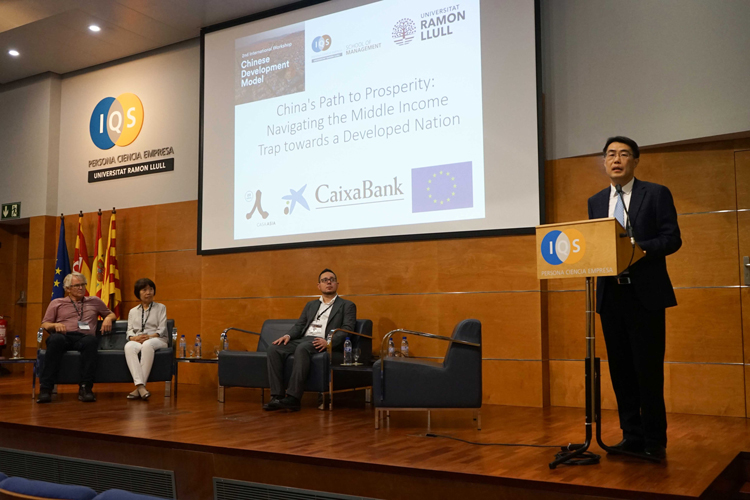The IQS School of Management recently organized the “2nd International Workshop on the Chinese Development Model” in early June, strengthening the school’s commitment launched last year to become an international reference in the field.

The IQS School of Management recently organized the “2nd International Workshop on the Chinese Development Model” in early June, strengthening the school's commitment launched last year to become an international reference in the field. The event had the collaboration of CaixaBank, thanks to the IQS Business Foundation, and Casa Asia and the European Union, thanks to the PoPMed-SuSDeV project, and featured collaboration from the Journal of Chinese Economics and Business Studies and the Chinese Economic Association.
The Workshop included several activities including plenary sessions with keynote speakers and roundtable sessions. In parallel, 11 papers were presented on various topics related to the Chinese economy. The event featured attendance by Mr Zhu Jingyang, Consul General of China in Barcelona, and Mr Amadeo Jensana, Director of Economic Programmes at Casa Asia.
During the two keynote speech sessions, the following topics were discussed: “Poverty, inequality, and common prosperity— Has China transformed into high income category?”, presented by Dr Shaohua Chen from Xiamen University, and “Common Prosperity for China Begins at 0 to 3 Years Old,” presented by Dr Scott Rozelle from Stanford University.
Professors Shaohua Chen and Scott Rozelle also took on leading roles during the roundtable discussion, open to public input, entitled “China's Path to Prosperity: Navigating the Middle Income Trap towards a Developed Nation.” This interesting discussion was expertly moderated by Dr Octasiano Valerio Mendoza, a member of the IQS School of Management, who ensured a fluid and enriching exchange of ideas.
The parallel sessions, which took place throughout the two days of the workshop, were grouped into different topics related to the Chinese economy and development, and featured various presentations selected in advance by the organizing Scientific Committee.
Under the general name of “Institutions and Economic Development,” the first session featured presentations of the papers: “Chinese economic development strategy: the co-evolution of transformations in the institutional matrix and in productive development policies” by Antonio Carlos Diegues (University of Campinas); “Putting Simplicity Back Into New Economic Geography” by Gina Arnesen (Norwegian University of Science and Technology); and “Nonlinearities in the institutions-growth relationship in dynamic panel data framework: Evidence from China's provinces” by Linda Glawe (University of Hagen).
The second session, entitled “Economic Policy, Growth, and Human Development,” included presentations of the papers: “Health insurance and mental health” by Suya Zhao (University of Birmingham); “Catch up with my husband as I can: Women's decision making power consequences of China's poverty elevation relocation program” by Yawen Ding (Peking University); and “Early-life Famine Exposure, Preference and Land Market Decision of Local Leader in China: Empirical Evidence Based on Regression Discontinuity Design” by Tonglong Zhang (South China Agricultural University).
Finally, the last session addressed the topic of “Investment and Innovation” with lectures by Martin Kleimann (Fern University in Hagen) on “Transport infrastructure and the spatial distribution of CO2 emissions”; Thomas Rowley (ESSEC Business School) on “Domestic Superstars vs Superstar FDI: Granular Comparative Advantage and Micro Implication”; and Mònica Martínez (Ramon Llull University) on “Unveiling the impact of China's Company Law reviews on information disclosure during Shareholder Meetings.”
As a conclusion, and in the words of its organizers, the “2nd International Workshop on the Chinese Development Model” resulted in an unprecedented gathering of academics and experts which underscored China's growing importance on the world stage. This event served to deepen the understanding of the different factors that contribute to the economic development of China and offered a unique overview of its development model. The high level of discussions and the diversity of topics addressed reflect the richness and complexity of the Chinese economy and reaffirm the commitment of the IQS School of Management to promote enriching and meaningful dialogue as a benchmark in research on Chinese economic development. The institution is already eagerly anticipating next year's edition of the workshop and hopes to continue serving as a bridge for the exchange of ideas and perspectives on this important topic.















